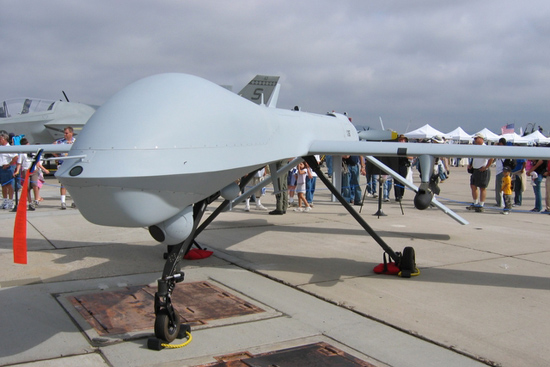Drones and the Law of War
LAW prof says UN critique only partly on target

A United Nations report in June criticizing the Obama administration’s reliance on unmanned drone planes to kill suspected terrorists in nonwar zones, such as Pakistan and Iraq, has led to scrutiny of the policy in the media. The administration has launched more drone attacks (107 strikes in Pakistan in just the last year) than the Bush administration did, according to Zeeshan-ul-hassan Usmani, a professor at Florida Institute of Technology.
The report expresses concern that other nations will follow the American lead and send drones across borders to kill suspects, turning the globe into a battlefield. Estimates of total civilian casualties from drone attacks range from almost 100 to 250 since 2006. But the toll among targeted militants was between 500 and 885, according to the New York Times, and those numbers, along with the fact that American pilots aren’t put at risk in the attacks, drive the administration’s inclination toward the technology, the paper reports.
The issue raises complex questions about the laws of war, moral considerations, and strategic concerns (the risk that we create more terrorists than we kill by enraging foreign populations with drone attacks that leave innocents dead). Then there’s the case of Anwar al-Awlaki, an American citizen and Muslim cleric in Yemen targeted by the Obama administration as an al-Qaeda recruiter rather than a combatant, raising some legal experts’ hackles about attacking nonfighters. The UN report urges the United States to reveal its legal basis for targeting those it seeks to kill, its precautions to avoid civilian deaths, and the process of investigating mishaps.
 Robert Sloane (right), an associate professor at the School of Law and an international law expert, shares some of the UN’s concerns, but takes issue with some of the report’s conclusions. Sloane has a degree from Yale Law School and a diploma from the Hague Academy of International Law. BU Today asked for his legal opinion on the drone matter.
Robert Sloane (right), an associate professor at the School of Law and an international law expert, shares some of the UN’s concerns, but takes issue with some of the report’s conclusions. Sloane has a degree from Yale Law School and a diploma from the Hague Academy of International Law. BU Today asked for his legal opinion on the drone matter.
BU Today: The UN report urges the United States to restrain, although not eliminate, drone attacks. Is that appropriate?
Sloane: I think the report has its merits, but I don’t agree with all of its positions. Parts of the report suggest that the only lawful killings in peacetime would be those where terrorists or their supporters are very close to initiating an attack. This is problematic because terrorists may operate from a state that’s unwilling or unable to control nonstate actors such as al-Qaeda within its borders.
Critics say we are killing large numbers of civilians in many of these attacks.
That may be true, and it may be unwise. But assuming the United States is pursuing a lawful target and has the consent of the state in which it’s operating, the principle under international law is proportionality, which requires that civilian deaths shouldn’t be excessive relative to the military advantage anticipated.
The law does concede that there are inevitable civilian casualties?
Absolutely. What some of the critics are suggesting is we’re not abiding by the proportionality constraint.
Does the law define proportionality?
Yes, but in terms that in practice leave much to the good-faith judgment of the reasonable military commander. Proportionality is a very flexible standard. There’s broad middle ground where reasonable, good-faith commanders can disagree on the allowable amount of civilian death or damage to civilian infrastructure.
What in the UN report do you agree with?
I agree that it’s troubling that we don’t know the criteria by which the Obama administration vets targets who are allegedly terrorists. In Guantanamo Bay, a high percentage of those detained for years as alleged terrorists has been found by federal courts to have been held on insufficient evidence, and not infrequently it’s fairly clear they’re innocent. Why should we have confidence that the CIA or the Pentagon are getting it any more accurate when they’re now deliberately killing people rather than just detaining them?
Some criticize the targeting of Awlaki for execution without due process, outside a war zone.
There is a strong case that insofar as we’re targeting a U.S. citizen outside a clear battlefield or war zone, at a time when he’s not directly participating in hostilities, the president cannot be prosecutor, judge, and executioner. My expertise is not in constitutional law, but it’s troubling to think that the only process due under the Constitution before the executive branch carries out a targeted killing of an American citizen in peacetime is an unknown process that takes place entirely within the executive branch.
I would like to see more oversight and transparency. After 9/11, the United States shared with NATO the intelligence showing that al-Qaeda had been responsible. As good policy, I think that to the extent the United States can elaborate its legal rationales with our allies, it redounds to the benefit of the United States. The more we go it alone, the more we undermine our credibility.
Rich Barlow can be reached at barlowr@bu.edu.

Comments & Discussion
Boston University moderates comments to facilitate an informed, substantive, civil conversation. Abusive, profane, self-promotional, misleading, incoherent or off-topic comments will be rejected. Moderators are staffed during regular business hours (EST) and can only accept comments written in English. Statistics or facts must include a citation or a link to the citation.